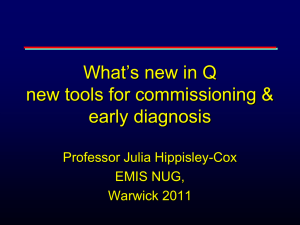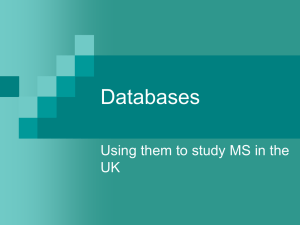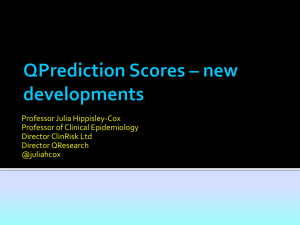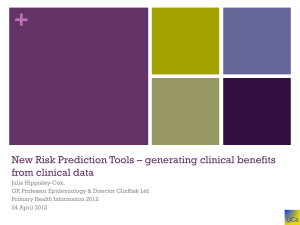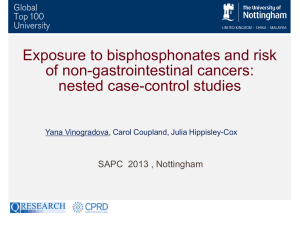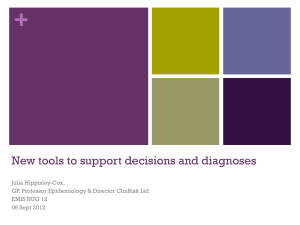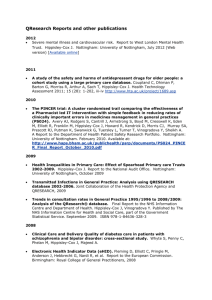Using GP databases for translational research
advertisement
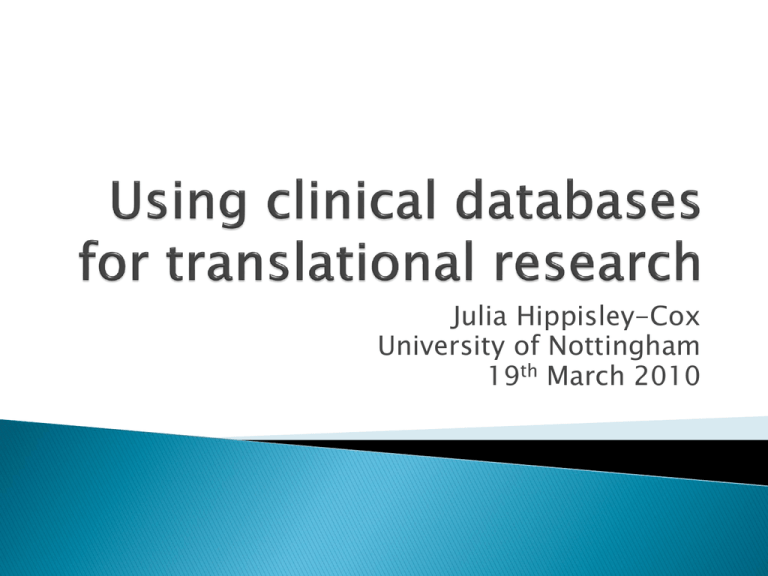
Julia Hippisley-Cox University of Nottingham 19th March 2010 Probably has many meanings Working definition here: ◦ Research where results can be directly applied into clinical care Need a very clear research question What exactly do I hope to find out? Is it important? Is it original? Is it interesting? Is it answerable ? Is it timely? Leads to ◦ Novel application of existing methods ◦ Development of new methods ◦ Better utilisation different data sources Leads to ◦ ◦ ◦ ◦ Lively academic debate! Changes in policy and guidance New utilities to implement research findings (hopefully) Better patient care Who needs to know the answer? When do they need to know the answer and why? What will they do with it? How will it affect clinical practice? How will you communicate it? How will you implement it? Is a negative result worth knowing? What are the consequences of not doing the study? Once question clear then early stats advice What is the study design? ◦ ◦ ◦ ◦ ◦ ◦ Cross sectional survey Cohort study Case control study Case series study Randomised controlled trial ? Other (specify) What are the outcome measures? What are the exposures? What are the confounders? Sample size calculation? Once design is clear then Type of analysis needed? Handling of missing data? Hierarchical data? Accounting for bias and confounding? Whose skills & experience needed to prepare data and undertake analysis. What type of data do I need? Purpose designed cohort or clinical trial Routinely collected NHS data Primary care? Secondary care? Other Anonymised or identifiable? Supplementary data needed? Data linkage require? questionnaires or blood tests Single outcome Single intervention Precise measurements Powered for outcome Good estimation benefit Underpowered for ADR Selected populations Clinical trials Multiple outcomes Multiple interventions Imprecise measurements Better for unintended effects Good powers Representative populations Observational Data Three main UK databases ◦ QResearch ◦ THIN ◦ GPRD All very good All need application form, protocol, ethics Same answer for 90% of studies Some special features for each Different terms and conditions Set up in 2002 Not-for-profit venture between EMIS & Nottingham University ◦ Management board ◦ National advisory board ◦ Scientific review board Practice feedback in 2010 QResearch THIN GPRD Year data started 1988/9 1988/9 1988/9 coverage UK UK UK Size 600 practices 450 practices 500 practices Basic content V similar V similar V similar Quality etc fine fine fine Ethics required yes yes Yes Basic linkages Deprivation & deaths Deprivation & deaths (soon) Deprivation & deaths Additional linkages Exploring options and risks Exploring options and risks MINAP Cancer HES QResearch THIN GPRD Ownership UoN & EMIS EPIC company Secretary State (MHRA) Core Funding None None Yes +++++ Training None yes yes Licensing Specific cuts data for specific projects Data cuts or entire database Data cuts or entire database Pharma studies No (unless significant safety issue) Yes Yes cost Cost per dataset 10K+VAT start up cost. Then bespoke. Academic = 190K+VAT over 4 years or per data cut Free under MRC license QResearch THIN GPRD status Not for profit Commercial Commercial Sample size calculations No unless funded yes Not sure Speed of access 3 months+ Check with THIN Check with GPRD Publication requirement Yes – everything must be published No No Identification patients Not possible Yes Yes Identification practices No yes yes Free text data No Yes yes Did you have the original idea for this research project? To your knowledge is this work original and capable of publication as original research in a peer- reviewed journal? Are you free to undertake this study and publish its findings without needing to clear it with the funding source or any other organisation? Do you agree to acknowledge the source of QRESEARCH data in any publication, paper or report? Do you agree NOT to attempt to identify patient(s) or practice(s)? Do you undertake to provide a copy of the final report of the project and copies of any publications within one year of the project completion? Do you agree NOT to release the data to any third party including the funder, sponsor or other such body? Do you undertake to check the data you are given within a month of receipt and report back any problems within that time? Do you have a statistician on the project team who has contributed to the design of the study and will advise on the analysis? Do you have a clinician who will act as clinical guarantor for the data? Two free online searchable databases ◦ Public health indicators ◦ Chest and allergy diseases Self register at www.qresearch.org For new funded research projects we will ◦ send you a login to researcher QWeb tools ◦ ask you to define the query you need ◦ You will need a clinician who understands GP data Specify protocol Specify data required Complete application process Obtain funding On receipt of data, check it Data preparation Data analysis Preparation of paper dissemination Good question Clear protocol Funding Data source appropriate to study Hardware/software IT skills -handling large dataset Statistics – advanced techniques Epidemiology Clinical academic Writing skills What is the service? How will it be delivered? Who will deliver it? Who will use it? Which data sources? How will it be funded? What service levels? Criteria for prioritising applications? How evaluate it?

